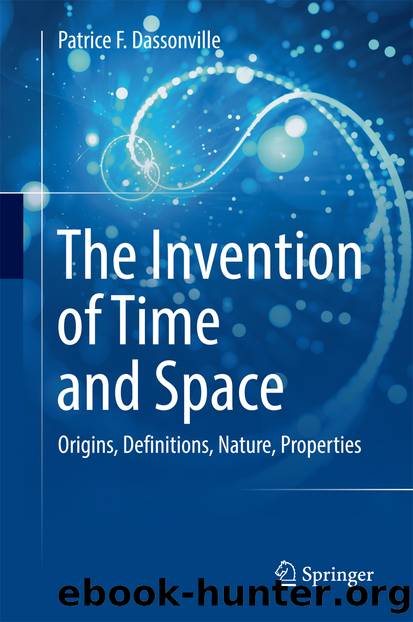The Invention of Time and Space by Patrice F. Dassonville

Author:Patrice F. Dassonville
Language: eng
Format: epub
Publisher: Springer International Publishing, Cham
6.2.1 Transtability
The Greek philosopher and mathematician Pythagoras (c. 570 BC–c. 480 BC) considered that everything changes, nothing disappears. For Parmenides (c. 504 BC–450 BC) in de Natura, the Universe was stationary; on the other hand, the philosopher Heraclitus (c. 540 BC–c. 480 BC) had an intuition of impermanence: (everything flows, nothing remains) (Ch. 5, 29). Lucretius wrote that nothing stays the same as it is now (Ch. 3, 15: Song V, 830). We also quoted Plutarch, who asserted the impossibility of observing a lethal substance twice in the same state.
The neologism transtable 3 is a technical convenience for saying with one word (in nuce: in a nutshell) that no system is in a steady state: every system is indefinitely seeking an equilibrium that it never reaches. This transtability is caused by continuing interactions between the system and the rest of the Universe. Therefore the state of a system is single, transitory, and irreversible. Apparent evolution of the state of a system:UNSTABLE STATE ⇒ DIFFERENT STATE SEEMINGLY STABLE
Download
This site does not store any files on its server. We only index and link to content provided by other sites. Please contact the content providers to delete copyright contents if any and email us, we'll remove relevant links or contents immediately.
Enlightenment Now: The Case for Reason, Science, Humanism, and Progress by Steven Pinker(7306)
A Journey Through Charms and Defence Against the Dark Arts (Harry Potter: A Journey Through…) by Pottermore Publishing(4805)
The Immortal Life of Henrietta Lacks by Rebecca Skloot(4577)
A Journey Through Divination and Astronomy by Publishing Pottermore(4379)
Elon Musk by Ashlee Vance(4121)
Origin Story: A Big History of Everything by David Christian(3687)
COSMOS by Carl Sagan(3617)
Alchemy and Alchemists by C. J. S. Thompson(3516)
Bad Pharma by Ben Goldacre(3422)
Enlightenment Now by Steven Pinker(3367)
Shadow of Night by Deborah Harkness(3360)
Inferior by Angela Saini(3311)
A Mind For Numbers: How to Excel at Math and Science (Even If You Flunked Algebra) by Barbara Oakley(3301)
Origin Story by David Christian(3194)
The Code Book by Simon Singh(3178)
Signature in the Cell: DNA and the Evidence for Intelligent Design by Stephen C. Meyer(3130)
The Elements by Theodore Gray(3050)
A Brief History of Time by Stephen Hawking(3022)
A Journey Through Potions and Herbology (A Journey Through…) by Pottermore Publishing(2849)
